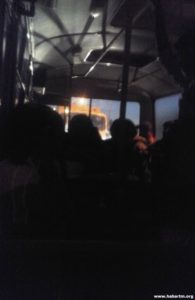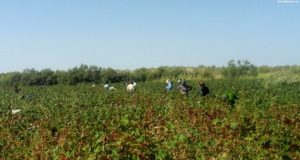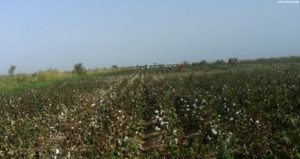Countries
Solidarity campaigns
Forced labor remains the norm in Turkmenistan’s cotton fields
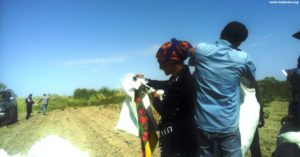
Thousands of people in Turkmenistan are again being forced to pick cotton. The autumn harvest began, however, on a positive note, with the authorities taking steps to ensure that classes of schoolchildren are not sent to the fields. Some cotton pickers in the remote north of the country even received increased rates for their work early in the season, but this soon came to an end when forced laborers were brought in.
Alternative Turkmenistan News is continuing to monitor the 2018 cotton season. Its observers have been talking to cotton pickers in Dashoguz, who talk of tighter surveillance, false accounting, low rates and primitive conditions.
22 September 2018: It’s four in the morning at the long distance bus station in the town of Dashoguz, northern Turkmenistan. People are assembling here to be sent to the cotton fields. An early start always means a long journey, and today’s pickers are being taken to the remote Shasenem area. Time will be needed to organize everyone and get them onto the buses and the journey itself will last around two hours.
It’s the second time this season that Bakhtiyar (all names have been changed for security reasons), a worker at Dashoguztelekom company, has had to stay overnight near the cotton fields. The first time he went for two weeks to the villages of Chochun and Yekederek in Akdepe district and now he’s off for 20 days to Ruhubelent district. No one asked Bakhtiyar, a cable jointer, and the other ordinary workers if they wanted to go to the fields. It’s compulsory and objectors will be sacked. Office staff pay to hire other people to go to the fields in their place – that’s compulsory too.
Bakhtiyar explains the system: “All our guys do their own cotton picking and don’t hire anyone else. No one wants to pay someone else 280 to 300 manats – that’s half our monthly salary [one manat is worth about five U.S. cents according to the real market rate.] Why shell out when you spend your time in the fields but still receive your salary for your main job? Everyone sees being sent to the cotton fields as compulsory.
“There’s a norm – 70 kg a day, but hardly anyone asks if you’ve met it. The harvest is overstated – a minimum of 150 extra kilograms is added to every tonne picked, and these figures are passed upwards for the accounts. Everyone can see that there’s not much cotton and that it’s impossible to meet the norm. So we’re just killing time in exile, if you like, in the cotton fields. Some people are angry that they’re away from home for no good reason. It’s understandable – everyone has their worries, their family, children, work, but we can’t leave ahead of time. Personally I see it as the chance to have a break in the countryside. I’ve got my fishing rods, I catch fish, relax. But who gains from this? This way of organizing the cotton-picking campaign is damaging for the state and the economy.”
Most of the pickers are from public sector organizations and institutes in Dashoguz. An ATN observer found out that on September 22 workers from the following enterprises went to Ruhubelent to pick cotton for an extended period:
- City municipal services – 52 people;
- Dashoguztelekom communications company – 20 people;
- Vegetable oil mill – 15 people;
- Repair works plant– 15 people;
- Dashoguzneftegazstroy (Dashoguz oil and gas construction), Obagurlushyk (Agricultural construction) and Dashoguztransgaz (Dashoguz gas transmission) – 60 people in total;
- Dashoguzgazosnabzheniye (Dashoguz gas supply), Dashoguzenergo (Dashoguz energy) and Dashoguzvodosnabzheniye (Dashoguz water supply) – 90 people in total;
- Fish factory – 15 people;
- Dashoguzkhleboprodukty (Dashoguz bread products association) – 25 people.
It should be mentioned that this season the education and health services dispatched the cotton pickers from their own head offices. Teachers, doctors and nurses hired unemployed people to go and pick cotton for an extended period, paying them 15 to 20 manats a day. The money was paid to designated workers chosen directly by the head of each institution.
It’s five o’clock by the time headcounts have been taken and the buses can move off. There are seven 40-seat buses for nearly 300 people. Some people have to stand, but are able to swap places with others during the journey. The entire luggage hold and part of the passenger compartment are crammed with mattresses, bedding, sacks of food and kitchen equipment.
At seven o’clock the buses arrive at a road junction in Ruhubelent, where representatives of the local administration and village councils are waiting to direct them to specific farmers’ associations. The convoy of buses breaks up into several parts to go to Ashyk Aydin, Bedirkent, Diyarbekir and other villages respectively. A village council representative gets onto each bus to give road directions. As far as the eye can see there are only fields, most of them overgrown with reeds. Some men on the bus say that the last few times they went even further: to Duyetam, Tazedurmush and Bozyap in Saparmurat Turkmenbashi district.
Khayitbay, a worker at Dashoguz vegetable oil mill, describes conditions for the pickers. “There are no facilities at all, here or there. We were given one large room for 42 people. You couldn’t really describe the room as accommodation as it was dark and empty and had bare earth instead of a floor with a few tatty felt mats laid out. We gave the women the house – there were 15 of them – and slept outside.
— We did the cooking on a campfire. The farmer brought cooking pots and an urn for water. We all brought food from home and pooled our supplies. We mainly brought food that was filling and cheap: and that’s groats – rice or ground rice, mung beans, joughara [sorghum] and pasta, peas and beans as well. Definitely a lot of onions, potatoes, cottonseed oil and flour, which we used to bake bread in the farmer’s clay oven. We took meat in the form of kaurma [chunks of meat fried in their own fat], as there are usually no refrigerators. We mostly made vegetable soup from carrots, pumpkin and pasta. Sometimes the farmer gave us some of his vegetables and bread or slaughtered some chickens, but we couldn’t rely on that.
But we were lucky, because last time in Akdepe district one of our groups of cotton pickers had to get by on their own for two weeks: the owner of the cotton field was some big shot with his own staff who lived miles away in Niyazov district and gave no help at all.
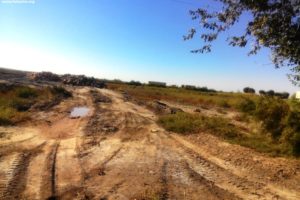 One of the cotton pickers cooked for everyone and made tea. There was no shower at all and no toilet for probably five kilometers. It’s easier for the men – we can wash in an irrigation channel, especially when it’s warm, but it’s hard for the women. We made a shower cabin with what we had to hand: we found four wooden sticks that were suitable and stuck them in the ground to make a square. Then we put sacking all around it and left one side for the entrance. While one woman washed using a jug of water heated in the urn, another would hold the ‘door’ closed so that the wind didn’t tear the sacking. The women even managed to wash their long hair in this shower cabin.
One of the cotton pickers cooked for everyone and made tea. There was no shower at all and no toilet for probably five kilometers. It’s easier for the men – we can wash in an irrigation channel, especially when it’s warm, but it’s hard for the women. We made a shower cabin with what we had to hand: we found four wooden sticks that were suitable and stuck them in the ground to make a square. Then we put sacking all around it and left one side for the entrance. While one woman washed using a jug of water heated in the urn, another would hold the ‘door’ closed so that the wind didn’t tear the sacking. The women even managed to wash their long hair in this shower cabin.
One of the problems was the distance to the cotton fields. The second week we were there, when we’d already picked the closest fields, we had to walk to fields two or three kilometers away. The farmers were surprised when we asked for a tractor and trailer to take us to the fields in the morning and home in the evening. For the inhabitants of these remote areas two to three kilometres is no distance at all.
This is an average day: up at 6.00, a short, meager breakfast and off to the fields. It takes an hour to get to the fields. Everyone should be in their rows by 8.00. We work until midday when we have half an hour for a modest lunch. Then we work non-stop until 6.00 in the evening. At 6.00 the harvested cotton is handed in and weighed and the other formalities are completed. We get to our accommodation after 7.00. The lighting isn’t good so we have to make supper in the dark. We boil water in the urns for tea. There’s nothing to do after supper so we go to bed in order to be up at 6.00 the next morning.
What price a kilo of cotton?
Following media reports on low pay and the use of forced labor in the cotton fields of Turkmenistan, some semi-independent Turkmen publications reported that from October 5 the price of a kilo of picked cotton had gone up: a kilo of medium staple cotton had risen from 0.40 to 0.60 manats and a kilo of fine cotton from 0.60 to 0.80 manats. However, ATN monitors in Dashoguz region dismiss these reports. At the start of the cotton season some farmers in the remote areas of Ruhubelent, Saparmurat Turkmenbashi and Akdepe districts did pay 0.50 manats per kilo of raw cotton, but not more. Observers say they did this in order to attract more pickers, as people do not voluntarily go to the remote areas. But there wasn’t any cotton at the start of the season anyway. This year the cotton, wheat and vegetable harvests are very poor because of a lack of water and the salt storm that hit the north of the country in late spring. Some farmers in the remote areas watered their fields only once.
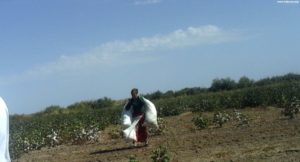 Towards the middle of September when public sector workers were bussed in to pick cotton, the farmers began to dictate their conditions. One worker, Arzygul, a cleaner at a Dashoguz kindergarten, said that farmers pay as little as they can get away with:
Towards the middle of September when public sector workers were bussed in to pick cotton, the farmers began to dictate their conditions. One worker, Arzygul, a cleaner at a Dashoguz kindergarten, said that farmers pay as little as they can get away with:
“Our pay is a real mess. There’s no single tariff for picked cotton. Well, there probably is on paper and in the agreements with the farmers but we’ve no idea what it is. It’s all up to the farmer: if he wants to he’ll pay up to 0.50 manats a kilo, if he doesn’t, he’ll pay 0.20 or 0.30 manats. Until the middle of September we were regularly paid 0.50 manats per kilo. We were delighted and many unemployed people chose to go and pick cotton because these were real earnings for them. But at the beginning of October the rates went down: our colleagues said that one farm in a farmers’ association was paying 0.30 manats per kilo of cotton and all the other farms just 0.20 manats. They were doing what they liked. As always, at the end of the season the farmer might refuse to pay at all, saying, I didn’t ask you to come, you came yourselves, so work for nothing or I’ll pick what’s left of the cotton myself.”
It is the unemployed, mainly from rural areas, who voluntarily go to pick cotton. The cotton didn’t grow well this year so if a picker managed to pick 60 kg in a day, that meant earnings of 30 manats or the price of a kilo of meat.
Meanwhile, state TV and newspapers report that the government and banks are paying the farmers on time and in full for the picked cotton. They broadcast staged video reports or print photographs where farmers in their holiday best receive wads of money at the bank and, as is the custom, touch them to their forehead.
Ylham, a worker at the city municipal services, who picked cotton at the Aybovur farmers’ association in Saparmurat Turkmenbashi District in September and October, said the reality is very different from its portrayal in the media. “There’s never been any proper procedure for payment and there still isn’t. Everything that’s shown on TV and written in the government controlled press and Internet resources is lies and deception on a national scale. There’s no hot food at the field camps, no amateur concerts, mobile libraries, itinerant traders or payment on time. We would be glad if they just brought us water in the fields, never mind food or concerts. We sometimes drink from the irrigation channels, because the farmer doesn’t want to bring us water, then we get stomach upsets. This is all filmed somewhere in Ahal region specially to show on TV. But the reality is grim. Everything is such a mess here in the cotton fields that everyone has to look after themselves.
In September ATN observers noticed that there were no minors on the cotton pickers’ buses. Local authority employees at the bus station made sure that no teenagers went cotton picking with their parents or by themselves as hired workers. If those responsible for dispatching the pickers spotted any youngsters, they would take them straight off the buses and call their school principal, and inform their form teacher. This time last year dozens of youngsters aged from 13 to 17 could be seen at the town bus station offering to work for 20 manats a day.
But by October when the order came from Ashgabat to speed up the harvest no one paid any attention to the presence of children among the adults. Teenagers of 15 and 16 could be seen among the cotton pickers who left at 5.00 in the morning for the villages of Chochun, Ruhubelent and Ashyk Aydin, though more often than not teenagers go picking for the day rather than stay overnight. These children were from the regional center, Dashoguz, but in the rural areas children can be seen working in the fields at any time. The numbers aren’t large – not whole classes, as used to be the case, just individual youngsters.
Bahadyr, 15, a pupil at school No. 9 in Dashoguz, is glad of the opportunity to earn some money cotton picking. “I know, our teachers at school have warned us many times that children should not be harvesting cotton. Our form tutors threatened us with commissions and inspections [from the education department], but what can they do? The most is phone my parents or send my classmates round to bring me to school. One time my elder brother had a real go at them and they ran off. And what’s the point? I earned enough for my winter clothes over the two weeks that I picked cotton instead of my neighbor – he’s a worker at the electricity network [Dashoguzenergo].”
Instead of changing this long running practice in order to ease the pressure and criticism from the international community, the government of Turkmenistan is carrying on as it always does – using threats and blackmail to force people from different professions to take part in the cotton campaign. Teachers and doctors have to set aside 500 manats or more from their salary to hire a replacement for a month. Hiring someone else is now an unwritten rule and people have to follow it. And there are plenty of public sector employees who think it perfectly normal to pay someone else out of their own pocket to go and take part in the cotton campaign.
“They [the hired workers] are working instead of us; why shouldn’t we pay them?” a teacher at school No. 4 in Dashoguz asked.
An ATN observer explained that paying for someone else to do work that they, the public sector employees, should supposedly do is considered a form of coercion.
— Do agricultural work in general and cotton picking in particular feature among your duties or job description?
— No, they don’t, but for us it’s kind of an obligation…
— What does an obligation mean?
— They tell us to do it…
— Who does?
— The principal, and he’s told by the province’s educational department, the municipal administration. And probably further up too – the command comes from Ashgabat.
— According to the Turkmenistan Labor Code and ILO conventions banning forced labor, which Turkmenistan has signed, you are fully entitled to refuse to pick cotton and to give money to hire other people. There are no exceptions to this.
— I know that some of our colleagues cite these arguments but hardly any of the other teachers follow their example.
Another teacher, questioned by an ATN, gave this explanation: “The majority don’t even think of objecting – it would cost them. They risk losing some of their teaching hours or even their jobs. So we keep quiet and hand over 20-25 manats without a murmur to hire someone else for a day’s work, as long as they stop hassling us about the cotton. Everyone prefers to work undisturbed in the classroom with the children to going away somewhere and living in field conditions and eating whatever they can get.”
Ikram, an unemployed resident of Niyazov district in Dashoguz region, explains how public sector workers reach agreement with the jobless. “Yesterday [September 25] I was hired for 22 manats; if it suddenly gets colder or starts raining tomorrow I can ask for two or three manats more. The people who have to go cotton picking – teachers and doctors – begin to bargain. I can pick 40-50 kg of cotton a day. And I’m genuinely sorry for the public sector workers, they’ve got just two choices: either go cotton picking themselves or hire me instead and me pay out of their own pocket. They could strike, of course, but they would only lose their jobs as a result and very likely their freedom too.”
Increased surveillance
Alternative Turkmenistan News and international organizations have suggested ways of tackling the issue of forced labor many times, but the country’s authorities still prefer to rely on physical control at the assembly points, in the fields and even over social networks. All the observers monitoring the use of forced labor and child labor in the cotton fields in Dashoguz region in 2018 are unanimous in their reporting of heightened supervision of the pickers by the National Security Ministry and Interior Ministry.
One monitor reported that every bus has its senior worker. He is in practice responsible for the pickers at the cotton harvest and on the way there. He makes sure that no one leaves ahead of time. It’s part of his job to see that the city dwellers have enough drinking water and enough time to eat and take a short break. But most of all he’s concerned that no one films the pickers and what’s going on in the fields on their phone. The slightest suspicion that someone is filming is enough for him to “make a call”. In no time at all people in civilian clothes arrive in private cars, take the person under suspicion aside and on the pretext of having a chat check his telephone.
“This is what happened to me when we were taken cotton picking near the village of Ruhnama, along the road to Ashgabat, in the Shasenem hills,” a young man who had gone with his friends as hired labour told an observer in Dashoguz. “I didn’t realize what was going on at first. Two men came up and didn’t introduce themselves, but I guessed that they must be from the security services. They demanded my telephone. I’d just taken a couple of photos of my friend standing in a silly pose in the rows. So when I was taking these photos for fun, the senior worker noticed and told the security services.”
An economic solution
Observers think that the substantial unemployment in the region means that the cotton could be harvested without bringing in people from unrelated professions. This would be possible if the central and local authorities used economic levers to tackle the cotton harvest, that is, if they paid decent money to the harvesters for their kilos, didn’t cheat in making reciprocal payments, and provided basic living conditions and food for the harvesters.
Source: ATN

